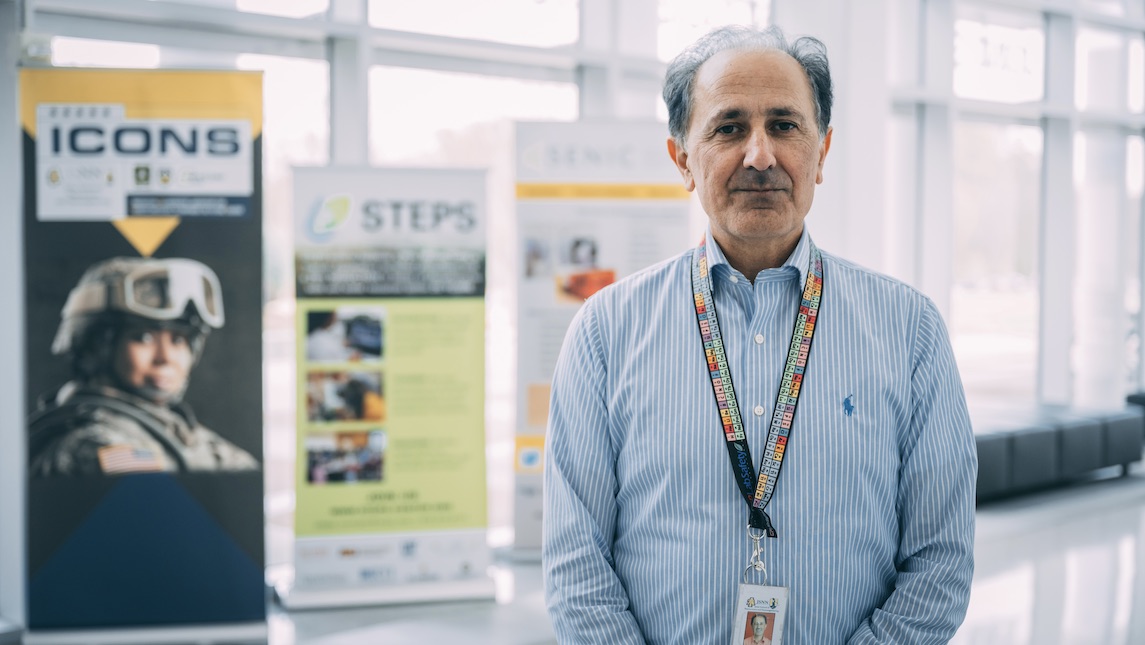As the pace of scientific and technological innovation speeds, so does the need for a culture of safety in the laboratory and beyond. In the Joint School of Nanoscience and Nanoengineering (JSNN), Mahdi Fahim is driving to instill such a culture among next-generation researchers.
Fahim is the first director of research operations and environmental health and safety for JSNN, a partnership of North Carolina A&T State University and UNC Greensboro. In just two years in the position, Fahim has implemented safety programs that have earned the school national recognition.
Earlier this year, CSHEMA — short for the Campus Safety, Health, and Environmental Management Association — awarded JSNN its Innovation Award for Process Improvement for small-sized schools. The award honors a new nanomaterials safety course for students that Fahim believes could be a model for universities nationwide.
A Course to Influence the Course of Research Safety
Fahim leads a three-credit-hour course in collaboration with JSNN Faculty, focused on all aspects of environmental health and safety. This interactive course brings in guest speakers and challenges students to take away practical lessons they can apply directly to their research. The course covers general concepts of safety in research, then dives deeper into chemical safety, nanomaterials safety, biological safety, laser safety, exposure assessment, research ethics, and more.
As Fahim explains, “Through the course, we try to create a generation of researchers who build a culture of safety that they take with them tomorrow to their work environment, wherever they go. It’s not just about today, it’s also about tomorrow.”
The course is just one aspect of the process improvements that Fahim has led at JSNN. While the school had a safety committee and elements of a safety program in place when Fahim arrived in November 2021, an environmental health and safety website now links to 15 different safety programs, ranging from respiratory protection to X-ray safety to emergency safety training.

Contributing to the Mission
Fahim quickly deflects attention from his role in the changes to the role of his colleagues and students. Teamwork, he says, has been vital.
JSNN Dean Sherine Obare sees Fahim’s success in working with faculty members and students as part of a larger story — one about the impact staff members can have on operations critical to the school’s mission.
“It has been a joy watching the transformations that Mahdi has made with regard to environmental health and safety that have led to an award-winning safety program for JSNN,” Obare says.
To his JSNN position, Fahim brought over two decades of experience working in environmental health and safety in academia. He previously worked at North Carolina State University and Case Western Reserve University, and he holds a master’s degree in industrial hygiene.
“From day one, I chose academia rather than industry because of the experience dealing with scientists, learning from them and being part of the new discoveries and scientific change in the world,” he says. “I take it in, and I always try to be the one that paves the way, making sure they have what it takes to have a safe, compliant, dependable, efficient, and effective research environment.”
Toward a Better Safety Model
These days, such an environment is only achieved when safety becomes habit, Fahim says.
“With the pace that science is enhancing and moving forward, we have found that the traditional safety approach is not sufficient enough,” Fahim says. “We come up with new products, new materials, and new equipment, and if scientists are not aware of the consequences of not considering safety and the implications of their impact on humans and the environment, it can’t be only one person’s job to chase them.
“We have to catch up with this fast pace, and the only way is by building a culture of safety,” he adds. “I call it the seatbelt effect: You don’t have to think about it — it becomes part of your DNA, your habits.”
Fahim wants such a culture to be present not just at JSNN but within academic research in general, and he wants the school to be at the forefront. Next year, he’ll have a chance to share JSNN’s environmental health and safety accomplishments at CSHEMA’s national conference.
“I want my institution to be the best, to be a model when it comes to safety,” he says. “I’m very ambitious about what I do, and I am constantly looking for new ideas, new ways of doing better. And this is a journey that continues until I retire.”
Story by Dee Shore, AMBCopy LLC
Photography by Sean Norona, University Communications




